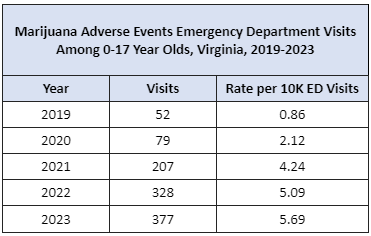State News
Nineteen Virginia Law Enforcement Officers & One K-9 Receive 2022 VACP Awards for Valor
Officers from Arlington County, Ashland, Big Stone Gap, Bridgewater College, Colonial Heights, Covington, Marion, Martinsville, Norton, Roanoke, and Virginia State Police were recognized for heroism.

The Award for Valor recognizes a law enforcement officer who, in the line of duty, performs an act of extraordinary heroism while engaged with an adversary at imminent personal risk.
Additionally, the Virginia Division of Capitol Police will be recognized with a Special Commendation for Heroism.
Officers receiving the 2022 Awards for Valor are:
Arlington County Police Department
Officer Jesse R. Brown
Cpl. Thomas C.J. DeNoville
Cpl. Juan P. Montoya
On August 25, 2021, Arlington County Police Officers Jesse R. Brown and Corporal Thomas C. J. DeNoville were speaking with another officer outside of the main entrance into the police station. A male subject walked up the nearby steps and attempted to enter the police department through the secure doors. The subject then turned his attention to all three officers, approaching them and asking if they were police officers. When the officers responded in the affirmative, the subject stated that he needed the officers to kill him and proceeded to advance on their position after removing two knives from his pocket.
Officer Brown and Corporal DeNoville distanced themselves from the subject, and Officer Brown put himself between the suspect and the unarmed, light-duty officer. Officer Brown quickly broadcasted details over the radio to alert other officers of their location and the situation.
Officer Brown and Corporal DeNoville drew their lethal and less lethal equipment options to cover the subject and gave him verbal commands, which were ignored. Officer DeNoville discharged his taser after the subject refused to drop the knives, however; the device’s probes did not achieve the required contact points necessary to incapacitate the subject.
At that point, the subject turned on Officer Brown, who was armed with his department-issued firearm, and began advancing on him with knives extended. Officer Brown quickly assessed the unfolding situation and created distance between himself and the suspect, who continued to ask the officers to kill him.
Corporal Montoya, who heard Officer Brown’s announcement over the radio and realized that he was approximately one block away from the incident, responded to the location to assist. His arrival distracted the suspect and caused him to change his course of movement away from Officer Brown. Officer Montoya successfully deployed his department-issued taser on the suspect, incapacitating him and allowing for other responding officers to take the suspect into custody.
This entire incident occurred in less than one minute. The involved officers quickly recognized the threat they faced and employed tactics and techniques learned through the Department’s extensive training program that emphasizes de-escalation when at all possible. Officer Brown, Corporal DeNoville and Corporal Montoya remained calm, focused, and professional, bringing a highly volatile and tense situation to a successful resolution.
The highly commendable actions of these officers not only saved the life of the suspect but protected the officers and others from being injured or killed. The Virginia Association of Chiefs of Police is proud to present Arlington County Police Officer Jesse R. Brown, Corporal Thomas C.J. DeNoville and Corporal Juan P. Montoya with the 2022 Award for Valor.
Ashland Police Department
Lt. Grant Bonistalli
Officer Jennifer Beyers
On September 9, 2021, Ashland Police Lieutenant Grant Bonistalli and Officer Jennifer Beyers responded to a domestic situation at an apartment involving an assault with injuries. The officers knocked at the door several times before an adult male answered the door. While the male remained behind a screen door, Lieutenant Bonistalli observed something in his hand. When asked what he was holding, the suspect stated, “a newspaper.” The officers continued to speak with the suspect, who was not compliant with the officers’ requests.
Upon further observation, Lieutenant Bonistalli observed a knife inside of the rolled-up newspaper. Lieutenant Bonistalli asked the suspect several times to place the knife upon the ground. The suspect began to back up, failing to comply with officer commands.
Concerned for the safety of the victim inside, Lieutenant Bonistalli and Officer Beyers entered the apartment where they challenged the suspect to drop the knife. The suspect turned toward the rear of the apartment. Not knowing where the victim was located and concerned for the victim’s safety, officers pursued the suspect further into the apartment.
Due to the suspect’s possession of a knife and to prevent the possibility of an additional assault, Lieutenant Bonistalli discharged his taser. Once the uninjured suspect was taken into custody, and the butcher knife was secured, the officers quickly refocused their attention to locating and assessing the female’s condition. They located her upstairs in the residence with significant injuries. They were able to address her injuries alongside the Hanover Fire/EMS Department and have her transported to the emergency room.
Both officers used their extensive training and exercised excellent de-escalation techniques and decision-making skills to safely take the suspect into custody. The VACP is proud to honor Ashland Lieutenant Grant Bonistalli and Officer Jennifer Beyers with the 2022 Award for Valor.
Big Stone Gap Police Department
Officer Michael Chandler (Posthumous)
In the early morning hours of November 13, 2021, Town of Big Stone Gap Police Officer Michael Chandler was asked by an individual to conduct a welfare check on a person at a vacant residence in the 2500 block of Orr Street. When Officer Chandler arrived at the residence, he encountered at least one individual. It was during this encounter that Officer Chandler was shot and gravely injured. A Wise County Sheriff’s deputy was first to arrive and found Officer Chandler lying unconscious in a ditch along a roadway to the home. His patrol car and another vehicle were found at the home with no other person being located.
Officer Chandler succumbed to his injuries around 7:00 p.m. that evening at the hospital with his family at his side. It was Officer Chandler’s 29th birthday. The suspect, who was on probation for grand larceny and conspiracy, was arrested without incident by the Kingsport Tennessee Police Department at a nearby motel.
The greatest fear of any police chief is the loss of an officer in the line of duty. Officer Chandler was well loved by the Big Stone Gap Community and was a true brother to his fellow Big Stone Gap police officers. The Virginia Association of Chiefs of Police is honored to recognize the service of Big Stone Gap Police Officer Michael Chandler with this posthumous Award for Valor.
Bridgewater College Campus Police & Safety Department
Police Officer John Painter (Posthumous)
Safety Officer J.J. Jefferson (Posthumous)
On February 1, 2022, around 1:20 p.m., Bridgewater College Campus Police Officer John Painter and Campus Safety Officer J.J. Jefferson responded to a call about a suspicious man close to Memorial Hall.
Officer Painter and CSO Officer Jefferson contacted the suspect directly outside of the building. After briefly interacting with the male suspect, the suspect opened fire and shot Officers Painter and Jefferson. During the gunfire, the suspect sustained a bullet wound, and he fled from the college campus buildings.
Officer John Painter and CSO Officer J.J. Jefferson faced down evil while defending the innocent lives within those buildings. While protecting the community they loved and cared for, Officer John Painter and CSO Officer J.J. Jefferson refused to back down or surrender their ground as they were killed in the line of duty by a person with malevolent actions that resulted in harm to the Bridgewater College family.
Officer John Painter and CSO Officer J.J. Jefferson, known by the campus community as the “Dynamic Duo,” always patrolled together, epitomizing community engagement. Their sheep-doggish heartbeat for the safety of the students compelled them to quickly respond. They knew that many students, faculty and campus staff could be in danger on what has historically been a safe and secure college campus.
Safety Officer Jefferson was an unsworn, unarmed security officer at Bridgewater College. While the Award for Valor is routinely reserved for sworn law enforcement officers, the VACP departs from that tradition in this event. We are proud to honor Bridgewater College Police Officer John Painter and Campus Security Officer J. J. Jefferson posthumously with the 2022 VACP Award for Valor.
Colonial Heights Police Department
Lt. James Stacey Whitt
On March 20, 2022, at 1920 hours, Colonial Heights Police Lieutenant James Stacey Whitt responded to a city residence for a report of a female who had been shot by her husband. He was able to get a statement from the female identifying her husband as the shooter.
Lieutenant Whitt and other officers conducted a search of the property and located a garage in the back of the residence. To ensure the safety of responding officers, Lt. Whitt opened the side door of that structure and located the husband inside the garage with a firearm in his hand. Lt. Whitt remained in the doorway and began to speak with the husband.
Lieutenant Whitt has had no formal negotiation training; however, he was able to keep the husband talking and remained engaged throughout the two-hour negotiation. A plan was devised to deploy a taser if the man moved away from the firearm. As the plan progressed, the taser was deployed but was ineffective, and the male turned and ran back to the firearm and pointed the firearm at Lt. Whitt. One officer discharged his firearm, missing the suspect. Lt. Whitt was able to gain control of the incident and began the negotiation process again. Meanwhile, Chesterfield County Police responded with negotiators and a S.W.A.T. team. Once they were on scene, Lt. Whitt was removed from the scene and negotiations resumed via phone. The suspect shot himself in the abdomen several hours later. Medical aid was provided and he and his wife both survived the incident.
Lieutenant Whitt remained calm throughout the incident, established plans of action, and was able to effectively communicate with the suspect. Lt. Whitt’s selfless act of courage and compassion allowed officers to remain safe and uninjured.
The VACP is honored to present Colonial Heights Lieutenant James Stacey Whitt with the 2022 VACP Award for Valor.
Covington Division of Police
Officer Caleb Ogilvie (Posthumous)
Officer Justin Jefferson
Detective Richard Baker
On March 14, 2022, Covington Police Officers Caleb Ogilvie and Justin Jefferson responded to a disturbance call at a local gas station convenience store. Covington Detective Richard Baker arrived separately to help secure the scene. The suspect got into an argument with a relative working at the business and fatally shot him. When Covington Police officers and Alleghany County deputies arrived on scene, they saw the armed suspect leaving the store. Shots were fired, leading to the death of the suspect and Covington Police Officer Caleb Daniel Ogilvie.
No other employees were injured in the shooting, and no customers inside or outside of the business or additional law enforcement officers were injured. Details of the incident are still under investigation by the Alleghany County Commonwealth’s Attorney.
Officers Ogilvie and Jefferson and Detective Baker responded quickly and bravely to protect the employees and customers of the business and to bring the incident to an end. The Covington Police Department has never before suffered the line of duty death of an officer.
The VACP is honored to present the 2022 Award for Valor to Covington Officer Justin Jefferson and Detective Richard Baker, and posthumously to Officer Caleb Ogilvie, who tragically lost his life in service to his community.
Marion Police Department
Officer Mason Wagoner
On Monday October 4th, 2021 Officer Wagoner was dispatched to the Smyth County Sheriffs Office processing center, to assist a female victim in obtaining an Emergency Protective Order against her husband. When Officer Wagoner arrived on scene, he spoke with the victim who advised that her husband was intoxicated and had displayed violent tendencies toward her. She further informed Officer Wagoner that he followed her to the processing center and was lying in wait, outside.
Officer Wagoner located the suspect outside of the center, and as he approached the vehicle he observed the suspect in an intoxicated state and noted an open container in the passenger compartment. When Officer Wagoner inquired about the open container, the suspect exited his vehicle and produced a compound bow. During these tense moments the suspect shouted over and over again “shoot me” and made clear he desired this encounter to end with violence. After making several verbal indications that he wanted to be shot by Officer Wagoner, the suspect nocked an arrow into the bow in order to force such a conclusion, by putting Officer Wagoner at a decision to defend his own life. Officer Wagoner immediately deployed his taser and simultaneously stripped the compound bow from the suspect ‘s hand. Officer Wagoner, along with assisting units, eventually took the suspect into custody, and the suspect was ultimately charged with attempted murder of a law enforcement officer.
If it were not for the valiant and professionally aware response of Officer Wagoner in disarming the suspect and effecting the arrest, this encounter may have ended with a loss of life. The Virginia Association of Chiefs of Police is proud to present the 2022 Award for Valor to Marion Police Officer Mason Wagoner.
Martinsville Police Department
Sgt. Chase Bennett
On February 5, 2021, while on patrol, Martinsville Police Sergeant Chase Bennett heard the sound of gunfire coming from the area of the El Norteno restaurant. Upon arrival, Sergeant Bennett reported that multiple people and vehicles were hurriedly leaving the restaurant. Sergeant Bennett exited his vehicle with his patrol rifle when the ongoing gun battle that had begun inside spilled outside. Multiple individuals were firing handguns in the restaurant’s outdoor seating area. At least one person had been hit and was on the ground while the others continued to fire. Sergeant Bennett gave commands to drop their weapons, but the suspects continued firing. Sergeant Bennett then engaged two of the armed suspects with his patrol rifle. Two of the armed suspects stopped firing and retreated into the restaurant, pulling a wounded man with them. Sergeant Bennett held the scene secure until multiple other units arrived. After the arrival of other units, Sergeant Bennett and others made entry into the restaurant, where they found that two men had been killed prior to Sergeant Bennett’s arrival and two others shot during the ensuing gun battle.
Sergeant Bennett’s quick and heroic actions in the face of imminent danger to put an end to the gun battle that had already claimed two lives and likely would have claimed the lives of others. In addition to saving lives, his actions led to the arrest and prosecution of multiple individuals. The Virginia Association of Chiefs of Police is proud to present the 2022 Award for Valor to Martinsville Police Sergeant Chase Bennett.
Norton Police Department
Chief James C. Lane
Sgt. Jason F. McConnell
On May 7, 2021, Norton Police Chief James C. Lane responded to assist other officers on a routine shoplifting call near the area of Walmart in the City of Norton. Chief Lane was searching the area around the shopping center for a suspect that fled on foot when he observed a man matching the description of the suspect. Chief Lane notified dispatch of his location and the suspect’s description as he pulled over to initiate contact. Before Chief Lane was able to exit his vehicle, the suspect pulled out a gun and opened fire on Chief Lane. Chief Lane was able to make the call for help over the radio, advising that he had been shot. He escaped the vehicle to return fire on the suspect.
Sergeant Jason McConnell (now Norton City Sheriff McConnell) responded to Chief Lane’s call for assistance in record time. Upon Sergeant McConnell’s arrival he found Chief Lane on the ground with gunshot wounds. Both Sergeant McConnell and Chief Lane were able to return fire on the suspect and eliminate the threat. Once the suspect was down and unarmed, Sergeant McConnell immediately rendered medical aid to both the suspect and Chief Lane. Chief Lane suffered several gunshot wounds that resulted in an extensive recovery. The suspect did also survive the incident with injuries from gunshot wounds and is awaiting trial. Norton Chief James Lane and Sergeant Jason McConnell, now Sheriff McConnell, responded bravely to end the incident despite the injuries to Chief Lane. The VACP is honored to present them with the 2022 Award for Valor.
Roanoke Police Department
Sgt. Michael E. Thompson
K-9 Loki
On July 24, 2021, Sergeant Michael E. Thompson and his partner, K-9 Loki, were on patrol in downtown Roanoke. There had been a recent spree of property crimes in the area and Sergeant Thompson, along with the patrol shift working that night, were positioning themselves in locations that may have been targeted by the suspected offender.
City of Roanoke E-911 Center personnel dispatched a call regarding a larceny from a motor vehicle that had just been reported near Sergeant Thompson’s location. As he scanned the area, Sergeant Thompson quickly spotted a person who appeared to match the description of the suspect from the property crimes spree. Sergeant Thompson attempted to speak with the person, but the individual refused to communicate with Sergeant Thompson or comply with his orders to stop. The suspect began to flee the area on foot, at which point Sergeant Thompson engaged in a foot pursuit with the suspect. He gave verbal warnings that his partner, K-9 Loki, would be deployed if the suspect did not stop running. The offender continued to flee, which is when K-9 Loki was deployed and caught up to the pursuit.
K-9 Loki managed to apprehend the fleeing suspect on the arm. The suspect then produced a knife but dropped it shortly after K-9 Loki adjusted his grip on the man’s arm. The man then pulled a personal taser device out of his pocket and began repeatedly shocking K-9 Loki in the neck with the device. Even though K-9 Loki was shocked in the neck several times, he did not loosen his grip or release the suspect’s arm. Sergeant Thompson began assisting his K-9 partner. He attempted to knock the taser out of the man’s hands and was shocked in the process. Eventually the man dropped the taser, but at that point he pulled garden shears from another pocket and began stabbing at K-9 Loki’s chest. Sergeant Thompson managed to knock the garden shears away from the man’s hands without injury to himself or K-9 Loki, but the fight was not yet over.
Astonishingly, the suspect then lowered his face to K-9 Loki’s and bit down on K-9 Loki’s snout. Although K-9 Loki appeared to be in tremendous distress and pain, he continued to hold onto the man’s arm. After numerous attempts to remove the man’s mouth from K-9 Loki’s snout, Sergeant Thompson resorted to using pepper spray on the suspect. The pepper spray was deployed, and the suspect began coughing and finally detached himself from K-9 Loki’s nose. At that point Sergeant Thompson gave the “release” command to K-9 Loki to assess any potential injuries.
Additional officers had responded to Sergeant Thompson’s distress call and were now on scene, attempting to take the suspect into custody; however, the man continuously fought back and would not comply with any commands. K-9 Loki bravely engaged with the suspect again, even after being injured. It was only after K-9 Loki’s second apprehension that the man was successfully taken into custody.
K-9 Loki was immediately rushed to the vet after this incident. Fortunately, K-9 Loki did not suffer any serious injuries and was able to return to work after the bite wounds on his nose healed. An injury to a K-9’s nose is potentially career ending, and we can all be very thankful that these injuries were not serious enough to prematurely retire K-9 Loki. K-9 Loki also was wearing a personal safety vest that was donated to the Roanoke Police Department by Spike’s K9 Fund. Without that vest, the garden shears would have made contact with K-9 Loki’s chest, and he could have been gravely injured or killed.
The suspect was charged with numerous property crimes, along with felony assault of a Police K-9 and felony assault of a law enforcement officer for the physical altercation involving K-9 Loki and Sergeant Thompson. Outstanding warrants for assault on a law enforcement officer from another jurisdiction also were served.
Though they did not know it at the time, this suspect had a violent history and was carrying a number of weapons. Sergeant Thompson and K-9 Loki did not hesitate to put themselves in danger to serve and protect the City of Roanoke. Thanks to Sergeant Thompson’s investigative skills and K-9 Loki’s courageous actions, a career criminal was apprehended before he could commit another crime or harm anyone else.
The VACP is very proud to present the 2022 Award for Valor to Roanoke Police Sergeant Michael E. Thompson and K-9 Loki.
Virginia State Police
Master Trooper Christopher D. Bingham
CVEO Paul G. Judy
On any given day, Virginia State Police Master Trooper Christopher D. Bingham and Commercial Vehicle Enforcement Officer Paul G. Judy will inspect several hundred commercial vehicles during their shift at the Dahlgren Weigh Station in King George County. On occasion, it is also common for passenger vehicles to pull into the weigh station parking lot to ask for directions or to make a momentary stop. Therefore neither officer gave much thought to the white Chevrolet Tahoe driving up to them shortly before 11 a.m. on March 25, 2021.
Officer Judy and Master Trooper Bingham were conducting an inspection when the Tahoe approached them. Officer Judy spoke to the driver very briefly and the Tahoe proceeded to pull around to the back of the weigh station office building and into the parking lot on the other side. Without further thought or concern, Officer Judy and Master Trooper Bingham returned to their ongoing inspection of a box truck. They were startled to see the Tahoe’s female passenger come sprinting by them screaming as she headed towards a shed near the access road. As they took notice of her, they saw the Tahoe’s driver chasing after her with a gun in his hand. Both quickly disappeared behind the shed and shots rang out.
Officer Judy and Master Trooper Bingham immediately ran towards the gunfire and before they could take cover, the Tahoe’s driver stepped out from behind the shed and began firing at them. Both the officer and trooper returned fire, striking the gunman. He succumbed to his injuries at the scene. During the exchange of gunfire, the driver of the box truck that was being inspected was struck by a bullet fired by the Tahoe driver’s gun. Officer Judy and Master Trooper Bingham secured the scene, called for rescue, split up, and began administering aid to the driver of the box truck and to the female, who were shot during the initial burst of gunfire behind the shed. Both survived their injuries. Neither Master Trooper Bingham nor Officer Judy was injured.
The Tahoe driver’s actions placed countless individuals in a life-and-death situation: the female passenger, box truck driver, Virginia Department of Motor Vehicle (DMV) employees working inside the weigh station building, motorists traveling just a few hundred feet away on Route 301, and Officer Judy and Master Trooper Bingham. Those lives were saved by the rapid, selfless actions of Master Trooper Bingham and Officer Judy. Both readily put their own safety at risk as they purposely engaged the shooter to get him away from the injured female and to prevent him from harming others.
It was later confirmed that the gunman had an extensive, violent criminal record. The Office of the Medical Examiner’s autopsy and examination confirmed the presence of multiple illegal narcotics in his bloodstream.
The concerted, valiant actions demonstrated by Master Trooper Bingham and Officer Judy went well above and beyond the call of duty. The VACP is proud to present the 2022 Award for Valor to Virginia State Police Master Trooper Christopher D. Bingham and Commercial Vehicle Enforcement Officer Paul G. Judy.
State News
U.S. Senate in FAA Bill Adds Flights at Washington National, Bucking Local Opponents
WASHINGTON — After hours of uncertainty Thursday, the U.S. Senate struck a deal to reauthorize several Federal Aviation Authority programs for the next five years, though Maryland and Virginia senators were vehemently opposed and lawmakers hoping to attach unrelated provisions lost out.
The bill heads to the House next week for final approval. Lawmakers from the lower chamber left Wednesday after approving a one-week extension for the FAA programs that expire Friday night. The Senate also passed the extension.

Terminal at Ronald Reagan Washington National Airport in Arllington, Virginia, just below, and the closest of three large international airports to, Washington, D.C. Most often called simply National Airport by locals, the airfield and terminals were named for Reagan, the 40th U.S. president, in 1998.
The late night vote, 88-4, drew resistance from the Democratic senators representing Maryland and Virginia. They held up speedier passage of the bill over objections to a provision that would allow more flights in and out of Ronald Reagan Washington National Airport, just over the Virginia border from Washington, D.C.
In a joint statement after the vote, Sens. Tim Kaine and Mark Warner of Virginia said the Senate “abdicated its responsibility to protect the safety of the 25 million people” who annually fly through Reagan airport, known as DCA.
The airport, a favorite for lawmakers as it’s closest to the Capitol, is limited by federal regulation on the number of “slots,” or flights that can take off and land per day.
“Just weeks after two aircraft nearly crashed into one another at DCA, this body refused to take up our commonsense amendment to remove a dangerous provision that would have crammed more flights onto the busiest runway in America,” the statement from Kaine and Warner continued, referring to an April 18 near-miss when two planes cleared to take off came within 400 feet of crashing.
The Virginia senators, as well as Sens. Ben Cardin and Chris Van Hollen of Maryland, held out for hours Thursday as they negotiated a vote for an amendment to strike or tighten a provision that would increase slots at DCA to five more landings and five more take-offs.
‘Over 200 member priorities’
Majority Leader Chuck Schumer, D-N.Y., agreed to bring what the senators described as a “compromise” amendment to the floor Thursday evening. The amendment proposed giving the final say on slots to the Transportation secretary after considering delays and safety.
But GOP Sen. Ted Cruz of Texas, one of the bill’s managers, objected, saying that the bill already “contains over 200 member priorities.”
Cruz, ranking member of the Senate Committee on Commerce, managed the bill with the committee’s chair, Democrat Maria Cantwell of Washington.
Cruz is a proponent of increasing slots at DCA, particularly for a direct flight from San Antonio.
Others support the increase as well: Democratic Sen. Raphael Warnock of Georgia had originally proposed adding 28 new slots per day. That idea was scrapped and replaced with Cruz’s amendment to allow five new daily flights in and out.
On the floor Thursday evening, Cruz pushed back on the safety argument, saying that “the FAA experts have recently clarified that this near miss (on April 18) had absolutely nothing to do with traffic on the runway.” He also blamed opposition on a lobbying effort from United Airlines, which operates a massive hub at Dulles International Airport in Virginia and wants to thwart competition.
Cruz said the final bill addresses safety issues by “ensuring we have sufficient air traffic controllers to monitor the traffic and protect safety.”
Late Thursday night after the bill’s passage, Cantwell took the floor to praise provisions that she said expand the aviation workforce, enhance pilot training and protect consumers.
Among its many provisions, the roughly 1,000-page legislation:
Directs the FAA to increase air traffic controller hiring targets;Raises the commercial pilot retirement age to 67 from 65;Prohibits mask-wearing and COVID-19 vaccine policies for passengers or employees;Directs the FAA to update drone testing and operating rules;Requires the Department of Transportation to create a seating policy to allow children to sit next to parents or guardians at no extra charge; andRequires airlines to automatically refund customers after three hours of delay for domestic flights and after six hours for international flights.
“These statutory rights are a big win for consumers,” Cantwell said.
Last flight out of the airport
Many lawmakers view the FAA reauthorization bill as the last major vehicle to which they can attach their priorities before November elections and the close of the 118th Congress.
That opportunity disappeared Thursday when the legislation’s managers decided against allowing non-germane amendments to ride on the bill.
Among the proposals lawmakers were eyeing as additions was Oregon Democrat Ron Wyden’s bipartisan tax bill that would expand the child tax credit and revive corporate tax breaks. Another included Sen. Josh Hawley’s Radiation Exposure Compensation Act, or RECA, which would reauthorize a fund for victims of U.S. radiation testing exposure. The fund expires June 7.
Hawley said Thursday afternoon that he wouldn’t object to the FAA bill, even if RECA wasn’t added on.
“I have no desire to tank the FAA reauthorization,” Hawley, a Missouri Republican, told reporters outside the Senate chamber. “I think we should have a reasonable process around it. But, if we’re not going to, we’re not going to.”
“At least we got automatic refunds for consumers out of this deal, which was good,” Hawley added, referring to his amendment with Democratic Sen. Elizabeth Warren of Massachusetts that senators agreed to Tuesday.
Jacob Fischler contributed to this report.
by Ashley Murray, Virginia Mercury
Virginia Mercury is part of States Newsroom, a nonprofit news network supported by grants and a coalition of donors as a 501c(3) public charity. Virginia Mercury maintains editorial independence. Contact Editor Samantha Willis for questions: info@virginiamercury.com. Follow Virginia Mercury on Facebook and Twitter.
State News
Port of Virginia on Track to Have Deepest Channels on East Coast
Even while unexpectedly supporting the Port of Baltimore over the past three months, the Port of Virginia is on its way to having the deepest channels on the East Coast by next year, a distinction that will help it further support the exchange of domestic and international goods.

The Port of Virginia is on its way to having the deepest channels on the East Coast by 2026. (Courtesy Port of Virginia)
According to Port of Virginia CEO and Executive Director Stephen Edwards, such investments have helped the company maintain a competitive edge in the market.
Decades of foresight enable Va. to process cargo diverted from Maryland after bridge collapse
Last year, the port processed 3.25 million twenty-foot equivalent units (TEUs) — a unit of measure used in the industry to determine cargo capacity — which is slightly less than the 3.7 million it handled in 2022.
Baltimore aid
On Thursday, Edwards provided an overview of the port’s operations at an annual luncheon with business leaders and officials from around the commonwealth. He also detailed how the port handled additional cargo shipments that were diverted from the port in Baltimore after a ship crashed into a bridge above the port’s channel in March.
Officials from the Port of Virginia have handled about 15,000 additional container units and multiple ro-ro shipments, such as vehicles and machinery, to keep supply chains moving. The temporary measure is expected to end this month due to developments of reopening the Port of Baltimore.
“It’s a testament to our team, our operations, and the strategic investments in projects that we are able to meet these moments while still performing at the highest level,” said Edwards, who also commended other ports on the East Coast for rising to the occasion.
“When something works and works well, it is, after all, human nature not to pay too much notice, but the Key Bridge collapse put a spotlight on the vitality of our work and our industry,” Edwards said. “I know we’ve all felt a greater focus on the implications of what we do each and every day.”
Going deeper
Edwards said the port’s implementation of the $1.4 billion Gateway Investment Program is helping transform its operations, highlighted by a dredging project to deepen the channel at Norfolk Harbor. The investment program includes plans to upgrade the Norfolk International Terminal — a semiautomated terminal that allows the transfer of containers — expand the central rail yard, and implement an offshore wind energy hub.
The port has also transitioned to powering all its terminals with electricity from clean resources and expanding its channel to allow for larger cargo ships.

House Speaker Don Scott, D-Portsmouth, presenting Port of Virginia CEO and Executive Director Stephen Edwards with a resolution passed by the General Assembly at the State of the Port luncheon in Virginia Beach on May 9, 2024. (Nathaniel Cline/Virginia Mercury)
Port officials said Norfolk Harbor is the only channel on the East Coast with Congressional authorization to dredge down to 55 feet.
Once the dredging and widening are complete, port officials said the harbor will offer the “deepest, widest channels on the U.S. East Coast and commercial channels will allow safe, two-way traffic” for larger ships.
House Speaker Don Scott, D-Portsmouth, who presented Edwards with a resolution on Thursday commending the port’s work, said the commonwealth is committed to investing in the cargo terminals in Hampton Roads and Richmond.
“We’ve invested hundreds of millions of dollars to make sure that our port is the very best port with the deepest water, but we also have to continue to sustain that investment,” Scott said, adding that these investments create jobs and make the commonwealth more competitive.
As part of the integrated freight strategy between the port and Virginia, work is underway to expand the Hampton Roads Bridge-Tunnel, and widen Route 58 in Patrick County and Interstate 64 in New Kent.
by Nathaniel Cline, Virginia Mercury
Virginia Mercury is part of States Newsroom, a nonprofit news network supported by grants and a coalition of donors as a 501c(3) public charity. Virginia Mercury maintains editorial independence. Contact Editor Samantha Willis for questions: info@virginiamercury.com. Follow Virginia Mercury on Facebook and Twitter.
State News
Virginia Health Officials Launch ‘Surveillance System’ for Kids Sickened by Cannabis
Virginia officials are instructing healthcare providers to start keeping track of “adverse events” involving children and teens being exposed to cannabis products.

Attorney General Jason Miyares displayed a bin of THC edible products from Virginia stores. Experts say the products have caused a spike in poison control calls involving young children and teens. (Photo by Graham Moomaw)
In an April 24 letter to clinicians, State Health Commissioner Karen Shelton said her agency had received enough reports of minors getting sick from products containing CBD and THC, chemical compounds found in cannabis, that the state was establishing a “special surveillance system” to keep tabs on the issue.
“Reported symptoms for these adverse events have included vomiting, hallucinations, low blood pressure, low blood sugar, altered mental status, and anxiety,” Shelton wrote, adding that “some hospitalizations have occurred” as a result of minors consuming cannabis products.
The letter specifically asks that local health departments be made aware of any cannabis-related hospitalizations in patients under 18 years old and any “clusters of adverse events” affecting multiple minors.
“After a hospitalization or cluster is reported, VDH staff will collect information about the illness(es), possible exposures, and laboratory results,” the letter says.

State data shows an increase in emergency room visits involving minors and cannabis. (Source: Virginia Department of Health)
The Health Department provided data showing an increase in emergency room visits involving minors being exposed to cannabis and said the new surveillance system will help bolster those tracking efforts. In 2019, there were 52 ER visits. By 2023, the number had grown to 377.
That data only covers emergency room visits and doesn’t reflect every incident reported to health officials.
“As a result of these data, the special surveillance system was established in order for VDH to receive these reports directly and better assess the impact of adverse events related to consumption of products containing THC or CBD among children in the Commonwealth,” said Health Department spokesperson Cheryle Rodriguez.
The letter also points to an online portal allowing anyone who had an adverse experience with cannabis products to submit a report to the Health Department with information about what happened, where the product was obtained, and how it was labeled. The agency also noted that lab testing is available to “support patient and product testing.”
The tracking system set up by health officials is the latest government effort to mitigate the downsides of cannabis, as policymakers continue to debate what to do about adult use of marijuana and products close enough to weed to produce a similar high. Earlier this year, Gov. Glenn Youngkin pointed to health risks to children as one of his reasons for vetoing legislation that would have legalized retail sales of marijuana for purely recreational use.
“The most concerning consequence of cannabis commercialization is its impact on adolescents and our children,” Youngkin said in his veto statement, which also cited data showing increases in calls to poison control centers for children who consumed cannabis edibles.
There have been numerous news stories in the past few years of THC-related overdoses at Virginia schools, some of them being serious enough to require hospitalization. Last year, a high school in the city of Richmond took the unusual step of banning all candy after four students suffered “medical distress” after eating edibles believed to contain a form of THC, the intoxicating element found in marijuana, according to the Richmond Times-Dispatch.
As lawmakers have relaxed Virginia’s laws on adult possession of small amounts of marijuana, they’ve taken steps to crack down on legally murky products like delta-8 THC, which produces a high similar to marijuana but has gone largely unregulated because it’s typically derived from hemp plants.
Michelle Peace, a forensic science professor at Virginia Commonwealth University who specializes in vaping and cannabis research, said data collection and better testing will help health officials “get their arms around” the issue.
“It’s important to know how pervasive the problem is,” Peace said in an interview.
Peace has been doing her own research into the vaping habits of Virginia K-12 students by testing the contents of vape equipment confiscated by school officials. Out of 369 submissions, 82% contained nicotine, and 18% had some form of THC.
Much of that THC was “very highly concentrated,” Peace said, making it more likely that the user would experience negative effects.
“At the end of the day, there needs to be proper attribution as to what the child actually consumed,” Peace said.
Editor’s note: This story was updated after publication with additional information from the Virginia Department of Health.
by Graham Moomaw, Virginia Mercury
Virginia Mercury is part of States Newsroom, a nonprofit news network supported by grants and a coalition of donors as a 501c(3) public charity. Virginia Mercury maintains editorial independence. Contact Editor Samantha Willis for questions: info@virginiamercury.com. Follow Virginia Mercury on Facebook and Twitter.
State News
Virginia Attorney General Joins Efforts to Fight Back Against Title IX Changes
Virginia Attorney General Jason Miyares has joined a multi-state effort to stop new Title IX rules from going into effect.
The list of new rules designed to protect victims of campus sexual assaults and the rights of LGBTQ+ students has come under attack by Republican attorneys general in several states.
Miyares called the changes a “dangerous overhaul” of Title IX and said the new rules would negatively impact students, families, and schools in the Commonwealth. The ruling also comes after Gov. Glenn Youngkin’s administration overhauled the commonwealth’s transgender student policies.
“The Biden Administration’s unlawful rule would jeopardize half a century of landmark protections for women, forcing the administration’s social agenda onto the states by holding federal funding hostage,” Miyares said in a statement. “They are avoiding Congress and the constitutional process because they know it will not pass. We cannot roll back Title IX in the name of false equity.”

Virginia Attorney General Jason Miyares at the Virginia State Capitol on Jan. 10. (Nathaniel Cline/Virginia Mercury)
Attorney generals from Tennessee, Indiana, Kentucky, Ohio, and West Virginia have also signed onto the suit, which was filed in Tennessee. Separate lawsuits have been filed in other states, including Louisiana and Texas.
Title IX, which has undergone several transformations based on the political party in office, was created to address women’s rights and prohibits any federally funded school or education program from discriminating against any student based on sex since it was established in 1972.
The Department of Education said some differences compared to the previous version developed under the Trump administration, include protections against all sex-based harassment and discrimination, prohibits schools from sharing personal information and supports students and families.
Narissa Rahaman, executive director for Equality Virginia, said in a statement that the rule prevents opponents from weakening “crucial” civil rights protections, including for LGBTQ+ students, by ensuring that pregnant and parenting students have a right to equal education opportunities, protecting student survivors and guaranteeing the rights of LGBTQ+ students to come to school as themselves without fear of harassment or discrimination.
“Students across races, places, and genders prove every day that they can do great things, especially when there are strong Title IX protections in place, which is why the Biden Administration’s updates to the Title IX rules are essential to ensure every student can thrive at school,” said Rahaman.
The new rule is slated to take effect on Aug. 1 and will apply to complaints of alleged conduct that occurs on or after that date, according to the Department of Education.
Protections
While the ruling protects students and employees from all sex-based harassment and discrimination, it will also impact LGBTQ+ students and employees, including providing complete protection from sex-based harassment and prohibiting schools from sharing personal information.
Schools must act “promptly and effectively” to protect and treat all students and staff who make complaints “equitably.” Schools must also provide support measures to complainants and respondents, and act to end any sex discrimination in their programs and prevent any recurrence.
The rule further clarifies the definition of “sex-based harassment,” which means to treat someone unfairly because of their gender; and the scope of sex discrimination, including schools’ obligations not to discriminate based on sex stereotypes, sex characteristics, pregnancy or related conditions, sexual orientation, and gender identity.
The federal agency said the changes will empower and support students and families by requiring schools to disclose their nondiscrimination policies and procedures to all students, employees, and other participants in their education programs so that students and families understand their rights.
The final rule also protects against retaliation for students, employees, and others who exercise their Title IX rights, and supports the rights of parents and guardians to act on behalf of their elementary school and secondary school children.
The rule also protects student privacy by prohibiting schools from disclosing personally identifiable information with limited exceptions, which is something the Youngkin administration has opposed.
Advocates say one of the rights students should have is the power to decide who finds out about their transgender status, to protect them from being bullied or harassed.
Virginia policies
In 2021, the first model policies for transgender students were designed under former Gov. Ralph Northam to provide school officials guidance on the treatment of transgender and nonbinary students and to protect the privacy and rights of these students.
However, some schools declined to adopt the model policies, and the state law that led to them lacked enforcement incentives or penalties.
The current policies adopted by the Youngkin administration were revised to require parental approval for any changes to students’ “names, nicknames, and/or pronouns,” direct schools to keep parents “informed about their children’s well-being” and require that student participation in activities and athletics and use of bathrooms be based on sex, “except to the extent that federal law otherwise requires.”
Virginia schools have also not fully adopted the newly revised policies, and state law has not changed since the policies were overhauled in 2023.
The Virginia Department of Education faces two lawsuits over the policies adopted by the Youngkin administration.
“All Virginia students, including our transgender and non-binary students deserve to feel safe and welcomed at schools,” said Wyatt Rolla, a senior transgender rights attorney with the ACLU of Virginia. “Accessing restrooms, locker rooms and other facilities that are necessary when you are at school learning is a key part of our schools being inclusive of those transgender [and] non binary students that are part of our community.”
Athletics not included
The provisions under the new Title IX rule did not mention anything about requiring schools to allow transgender students to play on teams that align with their gender identity. Virginia has taken its own shot at banning transgender athletes from competing in sports through legislation.
In February, the Youngkin administration attempted to challenge the Virginia High School League’s policy on transgender athletes, the Daily Progress reported.
The proposed policy would have matched with the administration’s current policies that students should be placed on teams based on their biological sex rather than their gender identity.
The Virginia High School League, which oversees interscholastic athletic competition for Virginia’s public high schools, allows for transgender athletes to participate on teams that match their gender identity, but under certain conditions.
Simultaneously, lawmakers in the Virginia General Assembly controlled by Democrats killed bills, including Senate Bill 68, during the previous session that would have essentially banned transgender students from competing in sports.
Sen. Tammy Brankley Mulchi, R-Mecklenburg, who carried Senate Bill 723, said students like her 6-year-old granddaughter should have a choice to play with their own gender during a Feb. 1 Senate Education subcommittee hearing.
Mulchi’s bill would have required schools and colleges to have separate sports for boys and girls based on their biological sex. Any dispute would require a note from a doctor.
“If she [my granddaughter] wants to play an all-girl sport, I want her to play against girls that were born girls and not play against someone that is much stronger than her or can hurt her and take away her chances of a scholarship,” Mulchi said.
However, Sen. Stella Pekarsky, D-Fairfax, argued during the February hearing that whether students are competing with their respective biological sex or not “children of all ages, sexes have different builds and strengths and no children are alike on the same team.”
by Nathaniel Cline, Virginia Mercury
Virginia Mercury is part of States Newsroom, a nonprofit news network supported by grants and a coalition of donors as a 501c(3) public charity. Virginia Mercury maintains editorial independence. Contact Editor Samantha Willis for questions: info@virginiamercury.com. Follow Virginia Mercury on Facebook and Twitter.
State News
Bill Banning Certain Driveway, Pavement Sealants to Take Effect This July
After attempting to ban the products in previous sessions, the Democratic legislature passed a bill Republican Gov. Glenn Younkgin signed that bans the sale of pavement sealant containing a set of chemicals environmental groups say seep into the environment, causing health issues for wildlife and humans. The ban begins July 1.
House Bill 985 prohibits the sale of the sealant used for driveways and parking lots that use certain concentrations of Polycyclic Aromatic Hydrocarbons, or PAHs, chemicals commonly found in coal tar.
“PAHs are definitely toxic. There isn’t a question about that,” said Joe Wood, senior scientist with the Chesapeake Bay Foundation, a major backer of the bill. “When organisms — whether oysters, mice, or fish — are exposed to these products in research studies, they have caused negative health effects.”
But groups that use the pavement sealers, primarily the Pavement Coating Technology Council, pushed back against the bill during the session, saying they shouldn’t be stopped from using the PAH-heavy sealants because other sources of the chemicals release them into the environment.
“We’re concerned that small businesses across Virginia will get snarled by these violations and penalties and not have anywhere to turn to remedy that situation,” said Alex Thorup, a lobbyist on behalf of the PCTC.
Other sealers felt differently. Michael Jones, owner of Jones Striping and Sealcoating LLC, said the PAH ban shouldn’t be a problem, given the health benefits his employees experienced after switching to an alternative material and that his company has still found work.
“We learned, of course, first hand, that [the coal tar] is toxic, and it does burn the skin also,” Jones said in a Feb. 27 committee testimony. “We [switched] because of the health of our clients’ employees and, of course, protecting the environment.”
The chemicals and how often they are used
The PAH chemicals naturally occur in coal, crude oil, and gasoline. The PAHs in pavement sealants come from coal tar, a byproduct of coking, or heating up coal to make it a higher quality.
The pavement sealant uses coal tar to fill cracks and provide a smooth finish on top of asphalt. From there, the pavement’s dust is kicked up into the air by the wind, washed away by stormwater runoff, or knocked loose from abrasive tires on roadways.
A study from the U.S. Geological Survey found that house dust in areas around where coal tar seal coating was used had a PAH concentration of 129 milligrams per kilogram. The seal coat itself had a PAH concentration of 66,000 milligrams per kilogram. Coal tar comprises about 20 to 35% of the product.
Conversely, non-coal tar sealants — such as asphalt emulsion, usually made up of asphalt water and soap — produced lower PAH concentrations in house dust, as little as 5 milligrams per kilogram. The asphalt emulsion product itself typically has concentrations of 50 milligrams per kilogram.
“Asphalt and asphalt-based seal coat products have much lower concentrations of PAHs,” USGS stated.
The environmental health harm
Several different research papers point to the chemicals causing harm to ecosystems, though some of the research is disputed.
The USGS research found that people living near coal tar sealants were 38 times more likely to have an “extra risk” of developing cancer than those living near unsealed pavement. In the Elizabeth River, the PAH chemicals from a nearby wood treatment plant were found to be a “plausible link” to cancer in killifish.
The presence of PAH from leaking petroleum storage tanks in Lewis Creek led the Department of Environmental Quality to create a total daily maximum load limit, or TMDL, in 2006 to reduce the amount of pollution runoff.
“With successful completion of implementation plans, Virginia will be well on the way to restoring impaired waters and enhancing the value of this important resource,” the TMDL plan stated.
However, the Pavement Coating Technology Council has pointed to errors in the USGS research, stating invalid modeling was used. The group also called out PAH pollution research done in Austin, Texas, which has waterways with more of a rock-based bottom that soil washes away from instead of East Coast waterways with dirt bottoms that collect soil over time.
The Austin research sampled soils in the waterway in 2005, 2008, and 2023 and didn’t find an accumulation of PAH chemicals, said Robert DeMott, a toxicologist with environmental engineering firm Ramboll, in a Feb. 27 committee testimony.
“We found that the ban did not yield a noticeable reduction in PAH levels across all of those creek systems,” said DeMott. “A narrowly targeted approach of focusing on only one source is unlikely to change the environment at large substantially.”
DEQ Director Michael Rolband added testimony on the bill saying the PAH chemicals are toxic, but linking their presence in the environment with pavement sealants was questionable.
A 2018 DEQ report summarizing research on the topic stated: “Land-use analyses have found that PAH concentrations do not correlate well with impervious surfaces if roadways are included. However, if roadways are separated out, PAH concentration correlates weakly with roadways and much more strongly with other types of impervious surface (i.e., parking lots).”
What the bill does
The bill creates a new section under the Environmental Emergency Response Fund statute, which is used for cleaning up environmental hazards.
Del. Kathy Tran, D-Fairfax County’s legislation sets a ban on selling pavement sealers with a PAH concentration of more than 1% of the product weight after July 1.
There’s also a provision that lets businesses in Virginia with the product in stock sell their inventory, but no one will be able to use it after July 1 of next year. Violations of the bans would result in a $250 penalty; those funds would then be deposited into the Environmental Emergency Response Fund.
The changes shouldn’t be a problem, Tran testified in committee testimony, considering that most large retailers selling gallon buckets of the sealant for homeowners to use on driveways are no longer doing so.
Jones, whose business deals with practical aspects of the product, including applying it to the ground, added compliance shouldn’t pose a challenge, considering his business transitioned away from the coal tar product years ago.
The change may have resulted in a 5 to 10% cost increase for him. However, his company’s portfolio of smaller projects is still active, evidenced by a 450-square-foot parking lot he recently did in downtown Richmond, which used 350 gallons of low-PAH sealant for the job.
“The quality is the same if not better,” Jones said, adding that his work is “a drop in the bucket” compared to the size and number of projects in the rest of the state.
National sealant distributors, like SealMaster, which has several locations in Virginia, have endorsed the pivot away from coal tar sealants with higher PAH concentrations in favor of “environmentally friendly” sealers.
For Jones, the health and safety of his workers outweigh any cost increases from the alternative sealants he uses now.
“They were coming [to work], but they weren’t as happy,” Jones said of his employees who may have been injured by coal tar sealant and previously had to wear long sleeves and facemasks in the outdoor heat as a precaution.
This story was updated to correct that the year DEQ’s report came out was 2018 and the concentrations of PAH in a coal tar sealant product.
by Charlie Paullin, Virginia Mercury
Virginia Mercury is part of States Newsroom, a nonprofit news network supported by grants and a coalition of donors as a 501c(3) public charity. Virginia Mercury maintains editorial independence. Contact Editor Samantha Willis for questions: info@virginiamercury.com. Follow Virginia Mercury on Facebook and Twitter.
State News
New EPA Rules Will Force Fossil Fuel Power Plants to Cut Pollution
On Thursday, the U.S. Environmental Protection Agency released a sweeping set of rules aimed at cutting air, water, and land pollution from fossil fuel-fired power plants.
Environmental and clean energy groups celebrated the announcement as long overdue, particularly for coal-burning power plants, which have saddled hundreds of communities across the country with dirty air and hundreds of millions of tons of toxic coal ash waste. The ash has leached a host of toxins — including arsenic, mercury, lead, cadmium, radium, and other pollutants — into ground and surface water.

AES Indiana’s Petersburg Generating Station in Petersburg, Indiana, has been burning coal since the 1960s but will shutter all of its coal-firing units over the next few years. On Thursday, the U.S. Environmental Protection Agency released a sweeping set of rules aimed at cutting air, water, and land pollution from fossil fuel-fired power plants. (Robert Zullo/States Newsroom)
“Today is the culmination of years of advocacy for common-sense safeguards that will have a direct impact on communities long forced to suffer in the shadow of the dirtiest power plants in the country,” said Ben Jealous, executive director of the Sierra Club, one of the nation’s oldest and largest environmental organizations. “It is also a major step forward in our movement’s fight to decarbonize the electric sector and help avoid the worst impacts of climate change.”
However, some electric industry and pro-coal organizations blasted the rules as a threat to jobs and electric reliability at a time when power demands are surging. They also criticized the rule’s reliance on largely unproven carbon capture technologies.
America’s Power, a trade organization for the nation’s fleet of about 400 coal power plants across 42 states, called the number of new rules “unprecedented,” singling out the new emissions standards that will force existing coal plants to cut their carbon emissions by 90% by 2032 if they intend to keep running past 2039. Michelle Bloodworth, the group’s president and CEO, called the rule “an extreme and unlawful overreach that endangers America’s supply of dependable and affordable electricity.”
‘This forces that’
Many experts expect the regulations to be litigated, particularly the carbon rule, since the last time the EPA tried to restrict carbon emissions from power plants, a group of states led by West Virginia mounted a successful legal challenge that went to the U.S. Supreme Court.
But Julie McNamara, deputy policy director with the Union of Concerned Scientists, said the agency took great pains to conform the rule to the legal constraints outlined by the court.
“This rule is specifically responsive to that Supreme Court decision,” she said. “Which doesn’t mean that it won’t go to the courts but this is so carefully hewn to that decision that it should be robust.”
The four rules EPA released Thursday mainly target coal-fired power plants.
“By developing these standards in a clear, transparent, inclusive manner, EPA is cutting pollution while ensuring that power companies can make smart investments and continue to deliver reliable electricity for all Americans,” EPA Administrator Michael S. Regan said.
In some ways, they attach a framework to a sea change in electric generation that is already well underway, McNamara said.
Coal accounted for just 16% of U.S. electric generation in 2023, according to the U.S. Energy Information Administration. In 1990, by comparison, it comprised more than 54% of power generation. However, some states are more reliant on coal power than others.
In 2021, the most coal-dependent states were West Virginia, Missouri, Wyoming, and Kentucky, per a 2022 report by the EIA.
“This rulemaking adds structure to that transition,” McNamara said. “For those who have chosen not to assess the future use of their coal plants, this forces that.”
Heather O’Neill, president and CEO of the clean energy trade group Advanced Energy United, said the new regulations are a chance for utilities to embrace cheaper, cleaner and more reliable options for the electric grid.
“Instead of looking to build new gas plants or prolong the life of old coal plants, utilities should be taking advantage of the cheaper, cleaner, and more trusty tools in the toolbox,” she said.
The carbon rule
In 2009, the EPA concluded that greenhouse gas emissions “endanger our nation’s public health and welfare,” the agency wrote, adding that since that time, “the evidence of the harms posed by GHG emissions has only grown and Americans experience the destructive and worsening effects of climate change every day.”
The new carbon emissions regulation will apply to existing coal plants and new natural gas plants. Coal plants that plan to operate beyond 2039 will have to capture 90% of their carbon emissions by 2032. New gas plants are split into three categories based on their capacity factor, a measure of how much electricity is generated over a period of time relative to the maximum amount it could have produced. The plants that run the most (more than 40% capacity factor) will have to capture 90% of their carbon emissions by 2032. Existing gas plants will be regulated under a forthcoming rule that “more comprehensively addresses GHG emissions from this portion of the fleet,” the agency said.
Michelle Solomon, a senior policy analyst for Energy Innovation, an energy and climate policy think tank, predicts that most coal plants will close rather than install the costly technology to capture carbon emissions.
“Climate goals aside, the public health impacts of the rules in securing the retirement of coal-fired power plants is so important,” she said. Coal power in the U.S. has been increasingly pressured by cheaper gas and renewable generation and mounting environmental restrictions, but some grid operators have still been caught flat-footed by the pace of coal plant closures.
“I think the role of this rule, to provide that certainty about where we’re going, is so crucial to get the entities that have control over the rate of the transition to start to take action here,” she said. But the National Rural Electric Cooperative Association’s CEO, Jim Matheson, called the rules “unlawful, unrealistic and unachievable” noting that it relies on technology “that is not ready for prime time.”
And Todd Snitchler, president and CEO of the Electric Power Supply Association, a trade group for competitive power suppliers, called the rule “a painful example of aspirational policy outpacing physical and operational realities” because of its reliance on unproven carbon capture and hydrogen blending technologies to cut emissions.
A beefed-up Mercury and Air Toxic Standards rule
The EPA called the revision to the Mercury and Air Toxic Standards “the most significant update since MATS was first issued in February 2012.” It predicted the rule would cut emissions of mercury and other air pollutants like nickel, arsenic, lead, soot, sulfur dioxide, nitrogen oxide and others. It cuts the mercury limit by 70% for power plants fired by lignite coal, which is the lowest grade of coal and one of the dirtiest to burn for power generation.
For all coal plants, the emissions limit for toxic metals is reduced by 67%. The EPA says the rule will result in major cuts in releases of mercury and other hazardous metals, fine particulate matter, nitrogen oxides and carbon dioxide. The agency projects “$300 million in health benefits,” including reducing risks of heart attacks, cancer and developmental delays in children and $130 million in climate benefits.
Stronger wastewater discharge limits for power plants
Coal fired power plants use huge volumes of water, and when the wastewater is returned to lakes, rivers and streams it can be laden with mercury, arsenic and other metals as well as bromide, chloride and other pollution and contaminate drinking water and harm aquatic life.
The new rule is projected to cut about 670 million pounds of pollutants discharged in wastewater from coal plants per year. Plants that will cease coal combustion over the next decade can abide by less stringent rules.
“Power plants for far too long have been able to get away with treating our waterways like an open sewer,” said Thomas Cmar, a senior attorney at Earthjustice, a nonprofit environmental law organization, during a briefing on the new rules earlier this week.
Closing a coal ash loophole
Coal ash, what’s left after coal has been burned for power generation, is one of the nation’s largest waste streams. The 2015 EPA Coal Combustion Residuals rule were the first federal regulations for coal ash. But that rule left about half of the ash sitting at power plant sites and other locations — much of it in unlined disposal pits — unregulated because it did not apply to so-called “legacy impoundments” that were not being used to accept new ash.
“We’re going to see a long-awaited crackdown on coal ash pollution from America’s coal plants, and it’ll be a huge win for America’s health and water resources,” said Lisa Evans, a senior attorney with Earthjustice. “They are all likely leaking toxic chemicals like arsenic into groundwater and most contain levels of radioactivity that can be dangerous to human health.”
Groundwater monitoring data shows that the vast majority of ash ponds at coal plants are contaminating groundwater, said Abel Russ, a senior attorney with the Environmental Integrity Project. But under the old rule, Russ said, facilities could dodge cleanup requirements by blaming contamination on older ash dumps not covered by the regulation.
“This is a huge loophole,” Russ said. “You can’t restore groundwater quality if you’re only addressing half of the coal ash sources on site.”
However, several attorneys on the Earthjustice briefing said the new rules, which will require monitoring at clean up and hundreds of more ash sites, will only be as good as the enforcement.
“It’s meaningful only if these utilities obey the law. Unfortunately to date, many of them have not,” said Frank Holleman, a senior attorney with the Southern Environmental Law Center.
by Robert Zullo, Virginia Mercury
Virginia Mercury is part of States Newsroom, a nonprofit news network supported by grants and a coalition of donors as a 501c(3) public charity. Virginia Mercury maintains editorial independence. Contact Editor Samantha Willis for questions: info@virginiamercury.com. Follow Virginia Mercury on Facebook and Twitter.














































































